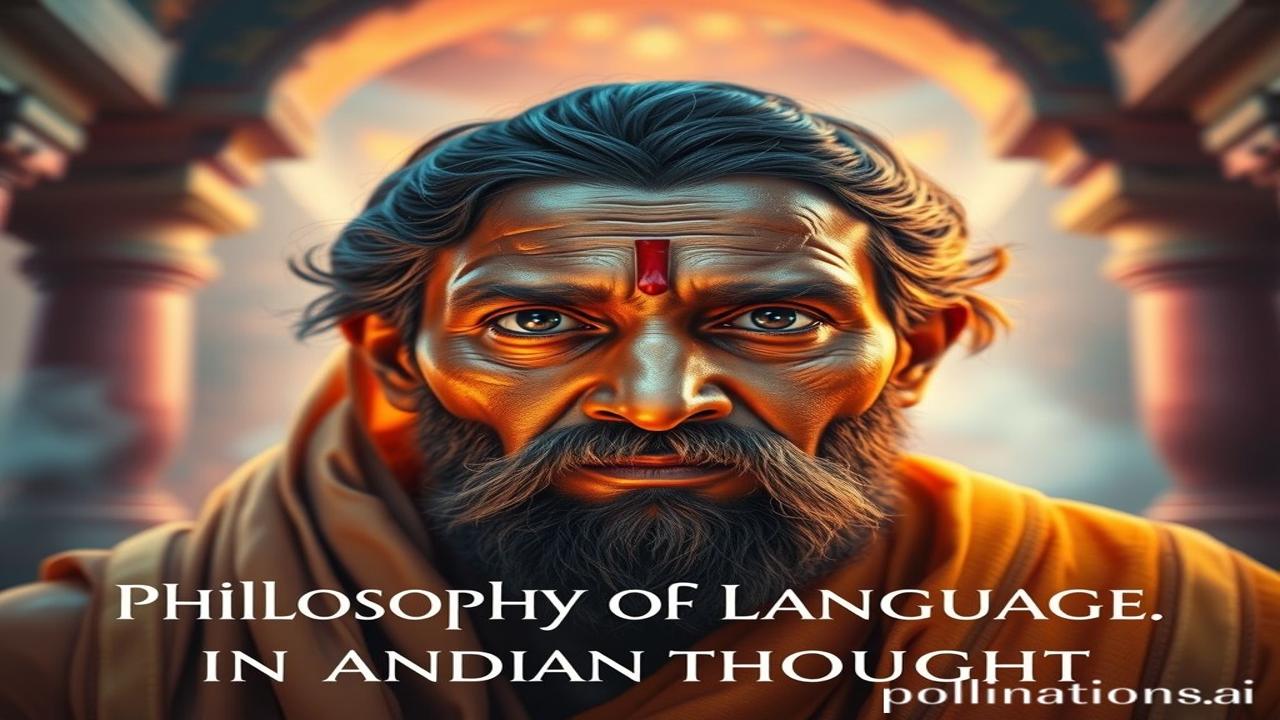Shabd Maya: Unveiling the Philosophy of Language in Indian Thought
Kabhi kabhi lagta hai, jaise hamare shabd hi hamari duniya banaate hain. Just imagine, you’re sitting by the Ganga, the air thick with the smell of incense and damp earth. The chants of the pandits blend with the gentle lapping of the water against the ghats. But beneath the surface of these sounds, there’s a whole universe of meaning, waiting to be explored. That universe is the philosophy of language, and it has deep roots in Indian thought.
Bhasha ka Itihaas: A Journey Through Time
What exactly is ‘philosophy of language’? Basically, it’s about understanding how language works, how it connects to our thoughts and the world around us. In India, this journey started way back, really, really long back, with the Vedas. We are talking about roughly 1500 BCE!
Think of it like this: language wasn’t just seen as a way to communicate, but as the way to access higher knowledge, to connect with the divine. This led to detailed explorations of grammar, etymology (the origin of words), and the very nature of meaning itself.
Important names to remember: figures like Panini (the grammarian), Bhartrihari (with his mind-blowing concept of Sphota), and later philosophers from the Nyaya and Mimamsa schools. They weren’t just linguists; they were spiritual seekers, using language as a tool for enlightenment.
Zameeni Sach: Life, Language, and Leela
Imagine a bustling marketplace in ancient Nalanda. Artisans haggling over prices, scholars debating the nuances of Sanskrit grammar, farmers selling their produce. Every conversation, every transaction, was steeped in the understanding that words held power.
Now, picture a group of students gathered around a guru. He’s explaining the significance of a mantra, emphasizing the precise pronunciation of each syllable. He’s not just teaching them how to speak; he’s teaching them how to unlock the potential of the sound itself.
Ma Rukmini, perhaps, is reciting a verse from the Upanishads, feeling a profound connection with the universe through the vibrations of the words. For her, language isn’t just a tool; it’s a pathway to self-realization.
The rulers, too, understood the power of language. Ashoka’s edicts, inscribed on pillars across the land, used Prakrit, a language the common people understood, to spread his message of dharma and peace.
Dharohar aur Pehchan: Echoes of the Past Today
Today, even as we WhatsApp and tweet, the echoes of these ancient ideas resonate. Think about the importance we still place on “shudh” (pure) Hindi or Sanskrit mantras in religious ceremonies. Consider the power of storytelling in our culture, where words are used to transmit values and traditions across generations.
Bharatiyata, that feeling of Indianness, is inextricably linked to our languages, our stories, and our understanding of the power of words. Even our art, music, and architecture are often inspired by the philosophies enshrined in our ancient texts.
Majedar Tathya ya Bhram-Bhanjak: Truth vs. Tale
Log samajhte hain ki Sanskrit ek “dead language” hai. Lekin asli sach yeh hai ki Sanskrit continues to be studied, spoken, and even used creatively in modern India. It’s a living link to our past, a source of inspiration for artists and thinkers. Another popular myth is that Indian philosophy is all about renunciation and detachment. But the truth is it offers a very sophisticated and practical approach to living a meaningful life, and language plays a vital role in that.
Drishya aur Bhavnayein: Sensory Exploration
Imagine the air in a monastery in Bodh Gaya, thick with the scent of sandalwood and the low hum of chanting. Feel the cool smoothness of a stone inscription etched with ancient scripts. Hear the rhythmic beat of a tabla accompanying a classical performance, where each note tells a story. Experience the vibrant colours of a kathakali performance, where every gesture, every facial expression, is a form of communication.
Antim Vichar ya Uddharan: A Moment of Reflection
Ultimately, the Indian philosophy of language reminds us that words are more than just labels. They are vessels of meaning, conduits of power, and keys to unlocking the mysteries of the universe.
As Bhartrihari himself said, “Anadir nidhanam brahma shabdatattvam yadaksharam. Vivartate’rthabhavena jagad yatra.” (The Word-principle is Brahman, without beginning or end, imperishable. The world appears as a manifestation of its meaning.)
So, next time you speak, remember the power of your words, and the profound tradition from which they spring. Think of it, every word you utter is a ripple in the endless ocean of language.
